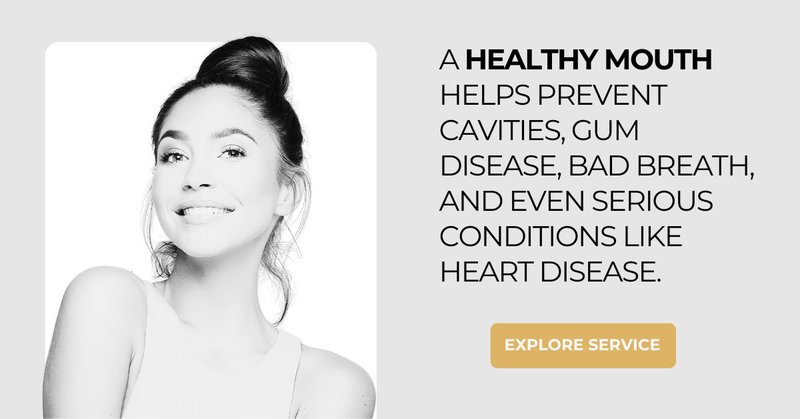Brushing every day isn’t enough. You need the right techniques to keep your smile healthy. Poor dental habits can lead to cavities, bad breath, and even health issues beyond your mouth. Dental hygiene basics include things like having a routine, brushing and flossing regularly, and using mouthwash. You also want to include consistent checkups with your dentist. Find out how to care for your teeth the right way.
Key Takeaways:
- Daily Routine: Dental hygiene basics include brushing and flossing for two minutes
- Use Mouthwash: It kills bacteria, freshens breath, and strengthens enamel (choose fluoride or antibacterial types).
- Dental check-ups: Visit the dentist every six months for checkups and cleanings. Go more often if you have dental issues.
- Good Dental Hygiene: Prevents cavities, gum disease, bad breath, and also serious health problems like heart disease.
- Skipping Oral Care: This causes tooth decay, gum infections, bad breath, and other health issues.
- Reducing Sugar Intake: Reduce sugar intake to minimize cavity risk.
- ADA-Approval: Toothpaste, floss, and mouthwash that are ADA-approved ensure safety and also effectiveness.
- Increase Water Intake: Drink water regularly to wash away food particles and neutralize acids.
- Oral Health Impacts: It impacts overall well-being, reducing risks of heart disease, diabetes, and infections.

The Fundamentals of Dental Hygiene Basics
The focus of dental hygiene basics is to help you keep your mouth clean and also free from disease. It includes brushing, flossing, and visiting the dentist. Having a healthy mouth helps prevent cavities, gum disease, bad breath, and even serious conditions like heart disease.
Why Dental Hygiene is Important
Your mouth is full of bacteria. Some are helpful, but others can harm your teeth and gums. Without proper care, plaque buildup leads to tooth decay and gum infections. Over time, poor oral health can affect more than just your teeth. Bacteria from your mouth can enter your bloodstream, contributing to heart disease, infections, and other health problems.
The Benefits of Keeping Teeth Clean
Maintaining good dental hygiene basics has many benefits. You can prevent tooth decay and gum disease by regularly brushing and flossing. This removes plaque that causes cavities and gum infections. Clean teeth also keeps breath fresh. The bacteria in your mouth causes bad breath. Preventing problems helps you save money on dental care. It is more affordable than treating cavities, gum disease or tooth loss. Also, healthy teeth will boost your confidence with a brighter smile. Finally, keeping your teeth clean protects your overall health. Gum disease has been linked to serious conditions like heart disease, diabetes and strokes.
Consequences of Ignoring Dental Hygiene Basics
Ignoring the basics of dental hygiene can have several consequences. One of the main consequences is developing cavities. Bacteria eat away at your tooth enamel causing decay. Another issue that is common is gum disease. Infections in your gums can cause swelling, bleeding and also tooth loss. Chronic bad breath is another issue. Poor oral hygiene allows bacteria to thrive leading to bad breath. In addition to tooth loss, you can also have serious health issues. Poor oral care increases your risk of infections that can spread to your heart, lungs and brain.
Caring for your teeth is about more than just having a nice smile. A routine rooted in good dental basics is your best defense against painful and costly issues. For more tips, visit the Smile Dailey blog for professional advice.
How to Properly Brush and Floss Your Teeth
Brushing your teeth correctly keeps them clean and healthy. Start with a soft-bristle toothbrush and fluoride toothpaste. Hold the brush at a 45-degree angle to your gums. Use short, gentle strokes to clean all tooth surfaces. Brush for two minutes, twice a day. Also, don’t forget your tongue. It holds the bacteria that causes bad breath.
Flossing regularly is also crucial. Flossing removes food and plaque from places your toothbrush can’t reach. Use about 18 inches of floss and wrap it around your fingers. Slide it between your teeth gently, curving the floss into a "C" shape around each tooth. Move it up and down to clean both sides. Floss once a day to keep your gums healthy.
Make sure to floss before brushing to remove debris trapped between your teeth. This allows fluoride from your toothpaste to reach these areas more effectively. Brushing and flossing are dental hygiene basics that keep cavities and gum disease away.
When and Why to Use Mouthwash
Mouthwash is a great tool for maintaining a clean and healthy mouth. It helps remove food debris, kills bacteria, and freshens breath. Not all mouthwashes work the same way.
The Role of Mouthwash in Oral Hygiene
Brushing and flossing clean most of your mouth, but some areas are harder to reach. Mouthwash swishes through every corner rinsing away leftover bacteria and plaque. If used daily, it may also help lower the risk of gum disease and cavities.
Choosing the Best Mouthwash for Your Needs
Different types of mouthwash serve different purposes. Some focus on keeping breath fresh, while others fight plaque and bacteria. If you have gum problems, an antibacterial mouthwash can help reduce swelling and infection. Always check for the American Dental Association (ADA) Seal to make sure it's safe and effective. To learn more about mouthwash, visit the ADA website.
Benefits of Antibacterial Mouthwash
Antibacterial mouthwash helps kill bacteria that causes bad breath, cavities, and gum disease. It is especially useful for people with braces, gum problems, or dry mouth. Since bacteria spread through saliva, rinsing with mouthwash can cut down harmful germs. Swish for 30 seconds after brushing and flossing. Try to avoid eating or drinking right away to let the mouthwash work. Using mouthwash should never replace brushing and flossing. Instead, add it to your daily dental hygiene basic routine for better oral health.
The Ideal Daily Dental Routine
Morning vs. Night Oral Care
Morning and night oral care have different goals. In the morning, brushing removes bacteria that build up overnight. At night, the goal is to clean food particles and plaque from the day. Skipping night brushing lets bacteria feed on trapped food increasing the risk of cavities and gum disease.
Steps for Maintaining a Strong Dental Hygiene Basics Routine
The basics for a good dental hygiene routine follow these steps:
- Brush Twice a Day: Use fluoride toothpaste and a also soft-bristled toothbrush. Brush for two minutes, covering all teeth, the tongue, and gums.
- Floss Once a Day: Remove plaque and food from between teeth where a toothbrush can't reach.
- Use Mouthwash: A fluoride or antibacterial rinse helps kill bacteria and also strengthens enamel.
- Drink Water Regularly: Water washes away food particles and neutralizes acids that harm enamel.
- Limit Sugary Foods: Sugar fuels bacteria, leading to cavities. Reduce soda, candy, and sticky snacks.
- Visit Your Dentist Regularly: Professional cleanings prevent plaque buildup and detect problems early.
Create a Schedule for Your Daily Dental Hygiene Basics
Everyone's oral care needs are different. Some may need extra steps like tongue scraping or an electric toothbrush for better plaque removal. If you wear braces or have dental implants, your dentist might suggest special floss or mouthwash. Stick to a daily routine that works for you, and never skip brushing before bed.
Visiting the Dentist for Checkups
Most people should see a dentist every six months. Regular checkups help prevent cavities, gum disease, and also other oral problems before they get bad. In a regular checkup, the dentist will clean your teeth and remove plaque and tartar that brushing and flossing miss. They will also check for early signs of decay, infection, or oral cancer.
Some people may need more frequent visits. If you have a history of cavities, gum disease, or other dental issues, your dentist might suggest checkups every three to four months. People with diabetes or weakened immune systems also need more frequent care.
Skipping checkups can cause long-term damage. Poor oral health has been linked to heart disease, stroke, and diabetes. Gum disease, if left untreated, can affect your overall health. Staying on top of dental visits protects both your mouth and body.
Good Dental Hygiene & Smile Dailey Dental
Good oral hygiene keeps your teeth strong and your body healthy. Perfecting the dental hygiene basics is key to having and maintaining a healthy mouth. Good habits will save you pain and money. It’s time to commit to a brighter healthier smile! Visit the Smiley Dailey Dental website to schedule your visit and to learn more.

